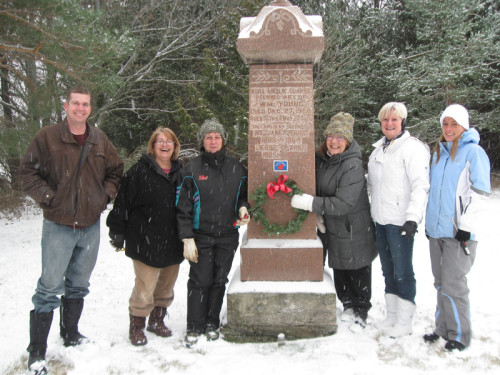Tom Sasvari
The Recorder
MANITOWANING—While the president of the War Pensioners of Canada (WPC) is vowing to make sure the remains of Canadian veterans are taken care of properly and in a dignified manner, an official with the Canadian Forces says there is no way that the remains of Canadian soldiers have been treated in the way the remains of some United States veterans were handled.
The concern comes after the recent announcement that the United States Air Force had disposed of the partial remains of at least 274 American troops in a Virginia landfill.
“I’m going to make sure our troops’ remains have and will continue to be tended to in a dignified manner,” Colin Pick stated in an interview with the Recorder. “I first heard the story about the remains being dumped in a US dump on the radio, after it had been reported in the Washington Post.”
According to media coverage, a report about the Dover Air Force Base revealed that the base had disposed of the partial cremated remains of veterans who had passed away at the nearby landfill. The partial remains could not be identified.
“I know in the United States, right now, family members of veterans are understandably appalled,” Mr. Pick noted, pointing out the story in the Washington Post.”
“I was so angry when I heard this story I was ready to write to the United States’ president myself,” he added. “I’m going to make sure the remains of our veterans are tended to in a dignified manner, not like this.” The United States Air Force first acknowledged the controversial practice last month and said it had abandoned it in 2008. However, it only disclosed the extent of the cases after an investigation by The Washington Post.
The incidents involved residual remains of fallen US troops, often killed in catastrophic explosions, found after families had received the bodies.
Jennifer Stadnyk, a captain and public affairs officer with the Canadian Expeditionary Force Command with National Defence, told the Recorder that “we take really great care all along the process of handling the remains of troops that have passed on and we discuss with the families of our military personnel in every stage of the process.”
Captain Stadnyk explained, “Canadian Expeditionary Force Command has a policy in place to repatriate human remains to Canada. Because each deployed task force has unique challenges with respect to its specific circumstances and operational capabilities, they also create their own ‘theatre standing orders’ to address specific circumstances.”
“Barring the most extreme or violent events, the ultimate aim of mortuary affairs is to return fallen members to their next of kin in a condition that would allow for non-distressful identification of the remains and the facility for an open casket funeral should they wish,” said Captain Stadnyk. “To that end, mortuary affairs services are provided by a civilian contracted mortuary services company. Mortician(s) may travel to the theatre of operations or to an intermediate staging area to take possession of the remains and ensure that they are preserved until the final place of rest.”
“The Canadian Forces and any contracted mortuary affairs service providers take great care to ensure the most respectful treatment of any human remains found in a theatre of operations,” continued Captain Stadnyk. “DNA testing is used to identify all human remains that are found, and the contracted mortuary affairs service provider maintains close relations with the family of the deceased in order to respect their wishes in the event of any additional human remains.”
“The repatriation of human remains to Canada usually encompass three stages and escorts are provided throughout all stages,” said Captain Stadnyk. Stages include “the collection of human remains and initial evacuation from theatre. The deployed Task Force Commander coordinates the collection and initial evacuation of human remains from theatre. Collection and preparation of human remains sometimes requires the assistance of personnel with specialized skills such as medical, investigative and/or mortuary affairs.”
Stage 2 is the strategic transfer points in transit process. Ms. Stadnyk explained, “In circumstances where human remains do not transit directly from theatre to the final place of internment, strategic transfer points are established. Canadian Expeditionary Force remains responsible for the return of human remains through all transfer points between theatre and the final destination in Canada.”
The third stage is reception in Canada, said Captain Stadnyk. “The point of arrival in Canada is normally Trenton, as preparation/post-mortem procedures are normally conducted in Toronto in conjunction with the pathology services of the Chief Coroner of Ontario and a contracted civilian mortuary service. The contracted mortuary affairs provider, in consultation with the selected funeral home, will coordinate movement of the human remains from Toronto to the final
destination.”
“As for your question as to whether the incident in the US has ever happened here in the past,” continued Captain Stadnyk. “Over the past 10 years, there have been a few occasions where additional remains have been discovered after the initial repatriation of a fallen soldier. Each time this has occurred, the remains have been handed over to the mortuary services provider, who conducts identification and DNA testing on the remains and always works closely with the family of the fallen to handle the remains according to their wishes.”



